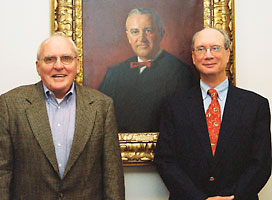

Venture Boldly

Office of Communications
2 East South Street
Galesburg, IL 61401

Knox College graduate Bill Barnhart says his new book, "John Paul Stevens: An Independent Life" -- is notable for a refusal to use any "off-the-record" comments.
 The book by Barnhart and co-author Gene Schlickman is the first complete biography of United State Supreme Court Justice John Paul Stevens, who announced his retirement today.
The book by Barnhart and co-author Gene Schlickman is the first complete biography of United State Supreme Court Justice John Paul Stevens, who announced his retirement today.
Barnhart and Schlickman's book is slated for release May 15 by Northern Illinois University Press. A 1968 Knox graduate, Barnhart recently retired as a financial columnist for the Chicago Tribune.
Barnhart says the book is not an 'authorized' biography: "There was no review by him, and no influence on what we wrote," Barnhart says.
"I've read a lot of books about the court, and a lot of them use unattributed sources for their 'inside secrets.' I made a decision early on that I wasn't going to do that," Barnhart says. "There's nothing more frustrating for a researcher than something that's 'off the record.' "
The longest-serving justice on the court today, and the second-longest serving of the modern era, is modest about his personal life, Barnhart said. "We met with Justice Stevens in his chambers, and he allowed us to have his 'guest seats' to observe court sessions," Barnhart says. "He didn't grant us extensive interviews -- he just doesn't sit down and reminisce about himself."
The Stevens biography is Barnhart's second collaboration with Schlickman, a former Illinois legislator. The first was "Kerner: The Conflict of Intangible Rights." Published in 1999, it is a biography of former Illinois governor and federal judge Otto Kerner. Kerner is both renowned for his work as chair of the Kerner Commission report on racial problems in American cities, and notorious for his subsequent prison sentence for bribery. The conviction occurred when Kerner was a federal judge, but the offenses dated to his earlier service as governor.
"Justice Stevens knew us from the Kerner book. He was on the 7th Circuit of Appeals in Chicago at the same time as Kerner." In addition, the theory of prosecution that led to Kerner's conviction later came before the Supreme Court, Barnhart says.
Barnhart says that two members of the Knox faculty were helpful in the writing of the book. -- Douglas Wilson, professor emeritus of English and an award-winning Lincoln scholar; and Lane Sunderland, professor of political science and an expert on the Supreme Court.
"When I was on the Knox campus in 2006, [Lane Sunderland] and I had a good talk. I had only a layman's understanding of the court. Lane is able to condense his expertise into ordinary language. That was very valuable to me," Barnhart says.
"When I was a student, I took courses in literature from Doug Wilson. I always admired him, long before he was a Jefferson scholar or a Lincoln scholar," Barnhart says. "When I was writing the Kerner book, I had written an article on Lincoln, and I spoke to [Wilson] about his research on Lincoln, about the importance of fact-checking. I've tried to do the same thing."
Barnhart received an Alumni Achievement Award from Knox College in 2006. In 2003, he participated in a panel discussion on campus, on the topic of ethics in journalism.
Published on April 09, 2010